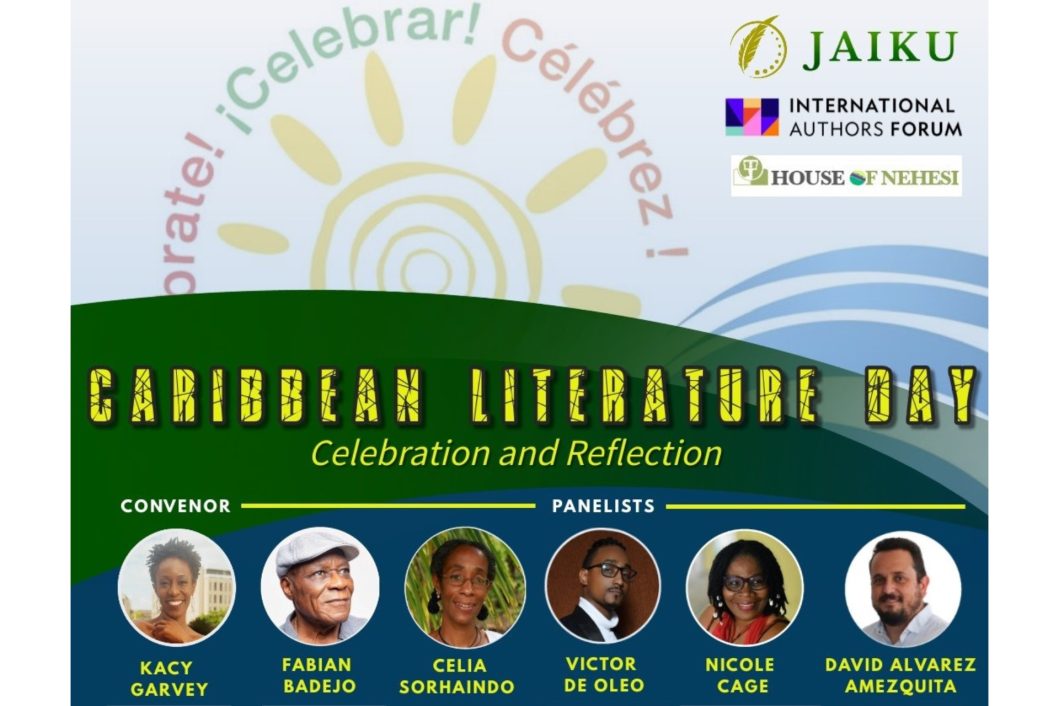The International Authors Forum (IAF) partnered with JAIKU Poetry in Jamaica and House of Nehesi publishing house in St. Martin to hold an event on Caribbean Literature Day, exploring the history and importance of Caribbean Literature, as well as the role of copyright protection in creating an environment for literature to flourish.
July 12th marks Caribbean Literature Day in remembrance of the burning of sacred books of the Maya people by a Spanish Franciscan priest on July 12th, 1562. IAF was invited by House of Nehesi to celebrate Caribbean literature and “grace this day with the attributes of the Maya’s creative force of writing, of Legba…and now celebrate Caribbean literature, one of the world’s youngest and most resilient literatures,” by buying, reading, gift-giving, posting on social media and discussing works of Caribbean authors.
The panel consisted of authors from across the Caribbean: Celia Sorhaindo from Dominica, Fabian Badejo from St. Martin, Victor Andrés De Oleo from the Dominican Republic and Nicole Cage from Martinique. Kacy Garvey, Jamaican poet and founder of JAIKU, hosted the event and was supported by Katie Webb, coordinator of the Latin America and Caribbean Chapter of the International Authors Forum and David Felipe Alvarez, an esteemed Colombian Copyright Lawyer.
The discussion rejected the homogenising definition of a single body of literature from the Caribbean that ignores its plurality and multilingualism and invited us to consider literature as an identity that is constantly connected by histories, cultures, hurricanes, earthquakes, and ongoing dialogue about change and loss.
Celia emphasised the fact that without considering who is asking and why, attempting to define Caribbean literature faces the risk of hazardous, inclusive, and non-representative stereotyping. Nicole Cage praised the work of the House of Nehesi for celebrating the Caribbean multi-faceted co-existence of cultures and languages through its publications, rather than allowing them to remain barriers, or divisions, saying it was a model for making “this Caribbean we dream of come true.” Fabian Badejo stated that the heterogeneity of the Caribbean is testified by the fact that visitors feel at home when visiting the Caribbean because of “the uniting fact of our non-homogeneity.”
Katie Webb gave an overview of IAF’s work to protect authorsand their ability to make a living through a strong copyright framework, and to ensure that authors’ work remains a respected and high-quality profession. IAF is a community where the world’s authors can share resources on how to overcome shared challenges, celebrate, protect and learn from each other’s linguistic and cultural diversity, and ensure fair working conditions by empowering authors’ to be confident and informed in their contract negotiations.IAF aims to strengthen authors’ confidence in their professional status, through solidarity and community, ensuring that literature and art can flourish and be sustained in all the world’s countries and cultures.
David Felipe Alvarez provided a history of copyright and explained its close relation to human rights. He explained that different countries’ legal bases are either in ‘authors’ rights’, which tend to give more importance to the human author, or ‘copyright’, where the emphasis is on the value of the authors’ work as part of commerce. In 1886, the Berne Convention was signed by 181 countries to date, which establishes basic standards of copyright protection that must be met. He guided the audience through the ever-evolving chain of philosophers, scholars and writers who have attempted to define the fair protection of the author in relation to their work, since John Locke in the 16th century established that “authors’ effort deserved reward”.
David echoed the panel discussion in describing the importance of building on the work of our forebears to make sure that copyright is fit for the challenges it meets in the 21st century, as much as literature is. Above all, copyright always seeks to balance the author’s fundamental needs for dignity – to be able to express themselves freely – and autonomy – to be able to live and sustain themselves by what they do, a challenge which must be taken on with every new publishing technology, since the invention of the printing press.
The event formed part of IAF’s Latin America and Caribbean Tertulia series, which showcases the creative expression of a group of Caribbean writers and includes a legal analysis applicable to that theme. This event discussed the pressing issues facing authors in the Caribbean along with the challenges of maintaining a copyright system which holds space for such discourses to emerge, ever negotiating threats to its continuity – from hurricanes to colonialism to artificial intelligence. Victor Andrés De Oleo proposed that it should be an educational priority in the ever-changing landscape which we call the Caribbean to maintain a discourse about Caribbean literature and IAF believes this holds true for the diverse literatures worldwide.

